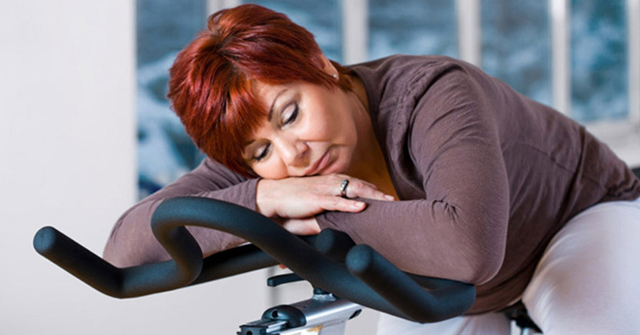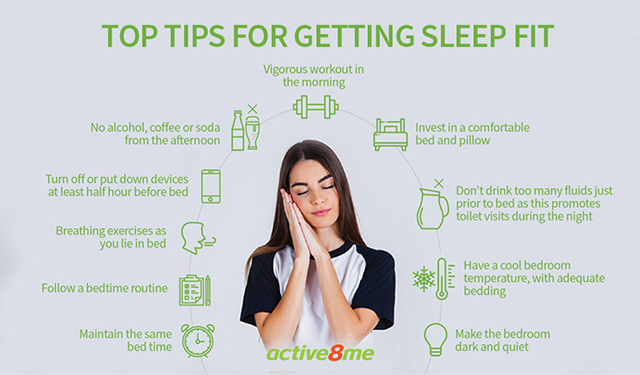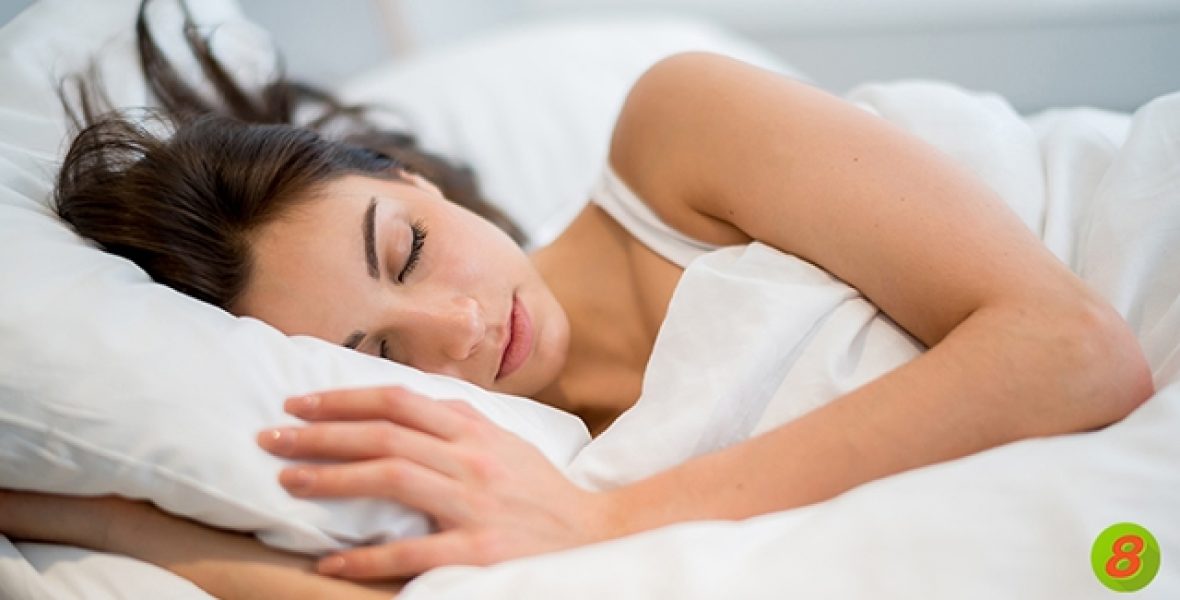Have you ever had one of those days where you’re grumpy? Find it hard to focus? Feel lethargic and struggle to workout? Crave sugary treats to pep you up? Feel fat and look old? You feel confused because you have been really sticking to good nutrition and regular exercise but the story in the mirror doesn’t seem to reflect that? Well, lack of sleep may to be blame! We often trade sleep for other activities without recognising the cost to our health and results. It might surprise you to know that the quantity and quality of sleep are just as important as diet and exercise!
Today we’re going to share with you 4 effects that a lack of sleep has on achieving your health goals. Then, importantly, give you some advice and tips to help you get ‘sleep fit’.
4 Signs lack of sleep is sabotaging your goals
1.Lack of sleep affects weight loss
Lack of sleep interferes with hormones responsible for hunger and satiety (feeling full). It causes an increase in Ghrelin which tells your body to eat, and decreases Leptin which instructs you to stop eating. A study in Sleep and Breathing journal found that having less than 5hrs sleep per night is significantly associated with weight gain and obesity. In addition, stress can be a product of, or directly related to, lack of sleep. During times of stress, you release the hormone Cortisol, which slows your metabolism and causes your body to retain fat, leading to slowed weight loss. So, while diet and exercise is important for weight loss, without sleep you could be undermining your efforts.

2. You look tired and old from lack of sleep
Everyone has experienced that awful look of bags under the eyes after a rough night’s sleep. But, there is more to sleep and skin health than meets the eye! There is loads of information about how nutrition can influence the look, feel and health of your skin, but the impact of sleep often gets overlooked. Research from the University Hospitals Case Medical Centre shows that inadequate sleep reduces skin health, accelerated skin aging and decreases the ability for skin to recover after sun exposure. Get that glowing, youthful skin with a combination of rejuvenating foods, sweaty exercise and… good sleep!
3. You’re failing with your focus, concentration and productivity from lack of sleep
It’s obvious that lack of sleep causes physical fatigue, but did you know it also has a significant impact on your concentration, judgement, problem solving skills and productivity, in the form of mental fatigue? Sleep is considered the time that learning and experience are cemented into your mind to form and improve memory. Without adequate sleep, you may easily fall into old unhealthy habits that don’t serve you well (such as overdoing coffee or sugary soft drinks) and find it harder to implement new routines or make poor decisions with regard to managing your work, social, family, nutrition and exercise regimes.

4. You’re undermining your ability to build a toned body with lack of sleep
Did you realise, it isn’t ONLY during the workout that your body does its main work? But the time AFTER your workout is just as important. Adequate sleep not only enables you to meet the demands of the day, but it is the valuable time when your body recovers, repairs and grows your lean muscle. Without enough sleep, you will struggle to achieve the entire benefits of your exercise regime.
During deep sleep, your pituitary gland releases growth hormone that stimulates tissue growth and repair. Poor quality or lack of sleep causes a rapid reduction in growth hormone secretion. Growth hormone deficiency is associated with increased obesity, loss of muscle mass and ability to exercise effectively.
Tips to better sleep
Tip – Avoid alcohol, caffeine and cigarettes
Caffeine and cigarettes are stimulants. This means they keep you awake! The Harvard Medical School Sleep Division suggests the effects of caffeine (coffee, sodas, tea, chocolate and some pain killers) take up to 6hrs to wear off. So, avoid caffeine and nicotine in the late afternoon or evening to ensure you drift into the land of slumber easily and avoid lack of sleep.
Alcohol is a sedative that can make you tired, but it also disrupts the quality of your sleep. Even small amounts of alcohol result in disturbed sleep later in the night. There are obviously other health issues connected to alcohol, so limit intake in general and avoid drinking too close to bed time.

Tip – Follow a calming bed time routine
Just like healthy eating and regular exercise, getting sufficient sleep and calming your mind from stress takes discipline. The easiest way to do this is to follow a bed time routine. Preferably, get ready for bed by following the same steps, at the same time each evening. This could involve taking a shower, doing some gentle stretches, completing your skin care routine, closing the blinds and doing some breathing exercises as you lie in bed, all in the same order at the same time, so it becomes a habit that prepares your brain and body for sleep. It works for kids and it will work for us adults too!
Tip – Limit screen time, give your eyes and your mind a break!
Everyone seems to keep their phone by their bed and it is often the last thing you are looking at before sleep. The blue light from the screens of phones and computers wreaks havoc with our hormonal signals for sleep. The hormone melatonin helps to prepare the body for sleep with levels of melatonin naturally rising in the evening. But, the blue light from devices can suppress your melatonin, meaning your brain thinks it should be switched on and awake instead of ready for sleep.
Additionally, the last things you see or interact with on your devices may cause heightened emotions. Anxiety, worry or excitement, will impact your ability to relax and inadvertently causing a lack of sleep. Here’s our tip – give yourself a cut-off time! Don’t use your phone or computer for at least half an hour before bed. And if you use your phone as an alarm, turn to ‘do not disturb’ mode and place it face down prior to bed or ideally invest in a funky new alarm clock and move your mobile to another room!

Tip – Do a vigorous workout to overcome lack of sleep
At Active8me, as you know, we advocate regular exercise and offer a variety of cardio, strength and flexibility workouts in the Active8me app. Regular exercise will help you achieve a toned body and improve your sleep. Research published in Mental Health and Physical Activity journal concluded that 150 minutes of vigorous exercise a week provided a 65% improvement in sleep quality. The ‘active’ participates also noted feeling less sleepy and had greater clarity during the day, compared to those with less physical activity.
However, try to avoid vigorous activity just before bedtime as this will energize your body rather than calm you in preparation for sleep. This is another reason why we advocate working out first thing in the morning (even if you’re not a morning person like many of us at Active8me).
Other tips to combat lack of sleep
- Invest in a comfortable bed and pillow
- Don’t drink too many fluids just prior to bed as this promotes toilet visits during the night
- Have a cool bedroom temperature, with adequate bedding
- Make the bedroom dark and quiet.
Remember, sleep is important – more important than you first thought we expect! It has an impact on all areas of your life from how you look and feel to your focus and productivity. With lack of sleep you could be sabotaging your best efforts. Conversely, with regular, good quality sleep you can supercharge your achievements. So, follow our top tips above and download our ‘Top Tips for Getting Sleep Fit’ infographic for your quick and valuable guide to getting sleep fit!
Sweet dreams …












